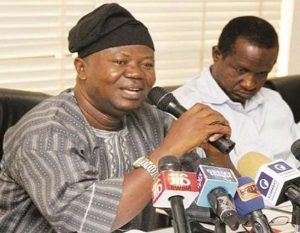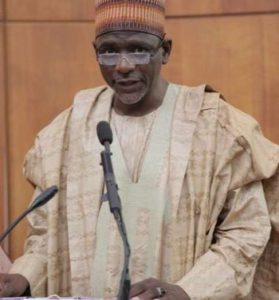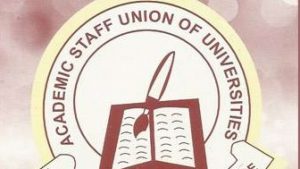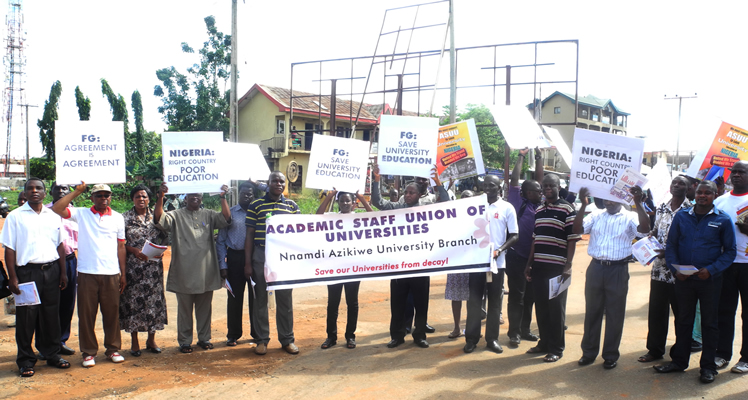By Academic Staff Union of Universities, (ASUU)
Today, our country, Nigeria, is in one of the most frightening and, some insist, most hopeless, situations it had ever been in the last four decades. The exponential increase in crime and criminality has reached an unimaginable proportion. No one feels safe anywhere and everywhere. Nigerians are routinely abducted in their homes, communities, farmsteads, just anywhere. Villages and towns are invaded in broad daylight by highly skilled and armed bandits; leaving in their trail gory tales of wanton destruction of lives and property. Nigerians in all parts of the country have lost count of how many of their loved ones – men, women, children and aged alike – they have struggled to bury amidst ceaseless flow of tears. This is beside countless others that are not accounted for. And it is no longer news that many intra- and inter-state roads are now havens of kidnappers and agents of death.

Prof Biodun Ogunyemi, ASUU National President, and a former president of ASUU
Access to public goods is getting farther and farther to the vast majority of the population. Public education system, from pre-primary to the university level, has ceased to be the priority of Nigerian rulers. In 2017, as many as 17 State Governors failed to access a total of N16.2billion Universal Basic Education (UBE) fund for failure to provide the counterpart funds required of their States. And by about the middle of 2018, an accumulated total of N76.12 billion was unaccessed by State Governors for the purpose of enhancing the quality of public primary and junior secondary schools. Nigerians rank 5th in number of foreign students in India. In 2016, about 15% of foreign exchange transactions by the Central Bank of Nigeria (CBN) was reported to have gone into paying fees abroad. In Ghana alone, Nigerian students spend about US $1 billion (about N360 billion) annually on tuition fees; this was higher than the budgets of Yobe, Ekiti and Taraba States in 2018!
In the same vein, medical tourism, an elite coinage, is now almost elevated to the level of state policy. Nigeria is perhaps the only country in the world where state officials – from the lowest to the highest – gleefully announce their “medical trip”. It seldom happens in other climes because of the snowballing effect on the psyche of the rest of the population. Like public educational institutions, the rest of us are consigned to ill-equipped and under-staffed hospitals while our rulers help themselves with public funds to access the best facility money can buy in any part of the world. Who cares about the education and health of the poor? The half-hearted promises and pronouncement on security, economy and fighting corruption have since lost meaning to the hapless citizenry who have been denied access to good quality of life enjoyed by members of the ruling class which is aptly described as being infested with mega-corruption.
Roots and dimensions of the crisis
Shortly after the 2015 General Elections when Nigerians were made to believe that a new dawn arrived following the 16-year post-military era (1999-2015) dictatorship, new concerns emerged about what was called economic recession which was also accompanied with escalating poverty and inequality, massive private accumulation (certain Nigerians were touted as the richest in Africa), mind-boggling levels of insecurity, increased ecological and environmental crisis, increased inter-ethnic, inter-faith and inter-communal clashes, increased instigation of resolution of the said clashes through violent means, etc., etc.
In the circumstances, the Nigerian ruling class had, since 1999 grouped and regrouped into various factions that they call “political parties” which relied on private wealth accumulated largely through their control of political power. Perhaps the most important characteristic of the political landscape is the ideological consensus among the various factions that enable them to pursue what is now generally referred to as neo-liberalism.

Mallam Adamu Adamu, Nigeria’s last known Education Minister
Neo-liberalism, for countries like Nigeria and other Sub-Saharan polities, had its origins in IMF/World Bank’s Structural Adjustment Programmes (SAPs) of the early 1980s. The neo-liberal economic and social policies of “less government” means privatization (of banks, power, roads, waterways, utilities etc.), reduction of public-sector employment and size of the public sector (sack of workers, close down of public institutions etc.), and abandonment of social services and provisioning (education, hospitals and other health facilities, social infrastructures, pensions, security, water supply etc.). It also means removal of subsidies to the youth and other vulnerable groups, removal of subsidies for energy and agricultural inputs, general deregulation of school fees, charges and other fees, devaluation of Nigeria’s currency, removal of protection for local industries, leading to closure of factories and industries; policies that increase foreign debts and general indebtedness incurred by private groups but transferred to Nigeria’s tax payers!
It is the same foregoing general policies that underpin what the current ruling class regime launched as its economic blueprint in 2017 and called Economic Recovery and Growth Plan (ERGP). This, as with SAP, they claim, will be led by the private sector. It is this their private sector (bank, power, airline), for which they sacrifice the future of our country, that has had to be consistently kept on life support with public funds they call “bail-outs”.
Under these general economic and social policies, regime-after-regime of the ruling class since the 1970s claims that it is waging a War Against Corruption – a “War” that is illusory, selective and of dubious credibility. No serious, credible war against corruption can be waged under economic and social policies that are pivoted on private and primitive accumulation.
Regarding the violence within, and instigation of violence among, the oppressed, we need to continually struggle to expose and popularize the facts of the situation on ground so that the oppressed in Nigeria can, through their own class struggles, make informed choices.
Critical issues that have engaged national and international attention are the questions of insurgency, banditry and kidnapping the question of herders-farmers clashes, and those of inter-ethnic/inter-faith antipathies! A huge body of data and information now abound that should enable Nigerians understand that the current generalized crises of violence are not only not inevitable but can be prevented. More important, this generalized violence has resulted largely from increased power of members of the ruling class to worsen mass poverty through class monopoly of political power, privatization of public resources, alienation of massive tracts of agricultural land to absentee farmers and landlords, agricultural and environment policies that drastically limit access of farmers and herders to arable land and pasture and increased proletarianisation of farmers and cattle herders by corporate agriculture and rich cattle owners across the country.
As for the urban centers, increasing withdrawal of “the state” from public welfare, the creation of “millionaire quarters” in our cities, towns and, even, villages has created and multiplied grotesque and unhealthy living conditions that breed hopelessness, crimes and violence. And given the character of the so-called “law-enforcement” agencies, largely as remnants of forces of colonial occupation and instruments of the ruling class oppression, their capacity is vitiated by the character of Nigeria’s ruling class. Where they cannot be controlled directly, segments of the ruling class are asking for “state” and LG Police Force.
The actual and main war in Nigeria today thus has two elements – the war inside the various factions of Nigeria’s ruling class and the war against Nigeria’s working people: workers, peasants, women, the youth and the dispossessed and oppressed generally.
All the political alliances and dissolutions of alliances inside the Nigerian ruling class are thus intra-class wars dictated by the processes of private accumulation and the struggle for hegemony in that class. There is, thus, as much violence inside the ruling class as the ruling class wages against the working people – unpaid salaries, refusal to implement wage agreements, removal of social services etc. by governors and LG Chairmen who share tribal, religious and other identities with the oppressed in their respective states and LGs.
In the circumstances ethno-nationalist, sectionalist and sub-nationalist and related wars are promoted among the oppressed to divert their attention from the pillage of Nigeria’s resources supervised by IMF and the World Bank and their Nigeria-born agents that they deploy from Washington and London to become Nigeria’s ministers and bureaucrats. Having cornered massive private resources via looting and privatization of the resources of Nigeria, our country’s tiny ruling class has been able to create private facilities (water supply, waste-disposal, power supply, etc.) and private armies that enable them to pooh-pooh and abandon public purpose.

What is to be done remains the all time big question
What is to be done?
ASUU and the Nigerian labour movement (spearheaded by the Nigeria Labour Congress), which includes the Nigerian Students and the youth have engaged the key questions of the underdevelopment, poverty and unabating crisis arising from the conspiracy between Nigeria’s ruling class and international financial and corporate institutions, in the last four decades or so.
In April, 1984, four months after the military wing of the ruling class seized our country, ASUU produced a prophetic document, How to Save Nigeria. The NLC and the student movement produced equally far-sighted documents or how to ensure that our country remains united and remains the property of the Nigerian people; not sold to a few Nigerians and their masters from abroad.
For those under the illusion that some or any, faction of the Nigerian ruling class can build, or are willing to build, an independent, self-reliant, democratic and socially just Nigeria, the events of the last twenty years especially have shown that the end of the road has been reached. The gurus of Neoliberalism in Washington are already circulating the obituary of neo-liberalism and, their denials notwithstanding, advocating an “oxymoron” Joseph E. Stieglitz called “Progressive Capitalism”: an oxymoron, because capitalism cannot be progressive!
More than thirty years ago, precisely in 1986 Nigerians in a nationwide debate rejected SAP and insisted on Socialist Transformation of Nigeria. That was the report of FGN’s own Committee on the National Political Debate. No wing of the Nigerian ruling class will want that transformation towards liberation of Nigeria to happen. Their masters in Brussels, London or Washington will not allow it either.
The task of that Socialist Transformation is that of the labour movement, the oppressed, the patriots and their allies. There are subsisting documents and policy positions in the archives of our movement. Our movement shall not relent in actualising that transformation.
Viva Nigeria’s Working People! Viva ASUU!! Viva Nigeria!!!
*The ‘State of the Nation’ is the full text of News Conference by the union at the end of its NEC at the ASUU-UNIPORT Branch Secretariat, the University of Port Harcourt, June 10th, 2019. It was read by Prof Biodun Ogunyemi, the National President.




























